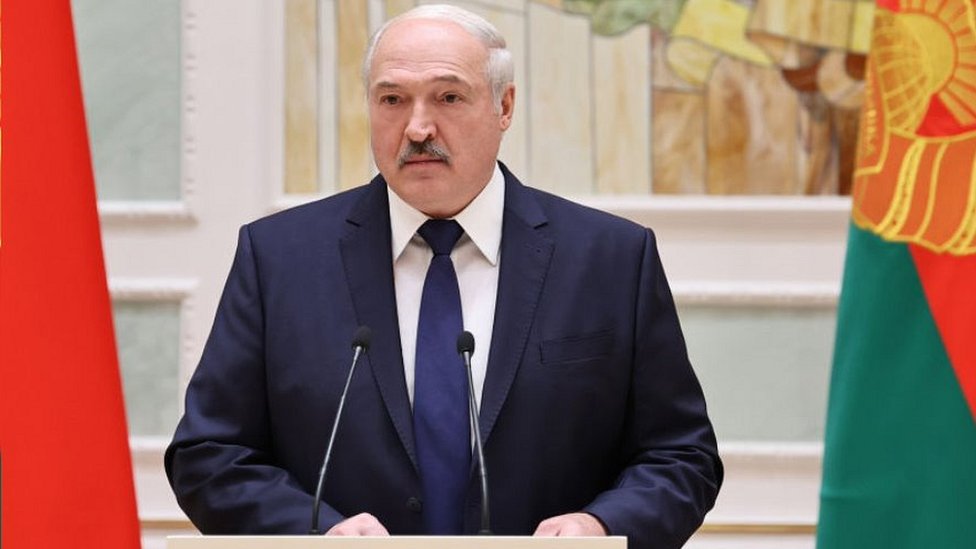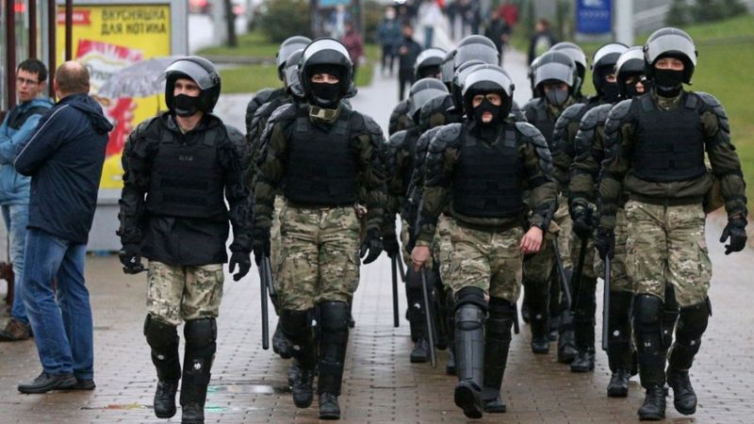The EU has added Belarusian leader Alexander Lukashenko and his son Viktor to its sanctions blacklist of Belarus officials, bringing the total to 59. The 15 added on Friday also include KGB secret police chief Ivan Tertel and President Lukashenko's chief of staff Igor Sergeenko.
The EU rejects Mr Lukashenko's claim to have won re-election on 9 August and deplores his crackdown on opponents. His son Viktor, 44, is a national security adviser.
Protests have swept the country since its long-time leader said he had won the vote, which was widely viewed as rigged. The main opposition leader, Svetlana Tikhanovskaya, said she had attracted between 60 to 70% of the vote and was forced into exile in neighbouring Lithuania immediately after the election.
The election-monitoring organisation, OSCE, said on Thursday that human rights abuses since the vote "were found to be massive and systematic and proven beyond doubt", and called for the official result handing Mr Lukashenko victory to be annulled "due to irregularities at all stages of the process".
UK Foreign Secretary Dominic Raab said the OSCE report had "exposed the fraud at the heart of the presidential elections" and he called for "new elections which are free and fair".
What the EU sanctions mean
The EU's latest sanctions block travel visas for the named officials and freeze any assets they may have in EU member states. In addition, EU citizens and companies are forbidden from lending to them.

The KGB police chief is accused of leading the state crackdown, involving "arbitrary arrests and ill‐treatment, including torture, of peaceful demonstrators as well as intimidation and violence against journalists".
The decision in principle to add Alexander Lukashenko and his son was made by EU foreign ministers on 12 October.
In September, the UK imposed sanctions on Alexander Lukashenko, his son and other senior Belarusian officials, under the UK's new human rights sanctions regime. The UK foreign secretary called Mr Lukashenko's actions "despicable".
Russian President Vladimir Putin however is backing Mr Lukashenko, reinforcing an alliance that goes back decades.
The Belarus opposition has organised huge demonstrations every Sunday since the election, usually with more than 100,000 people thronging the capital Minsk.
The EU and US government agree with the opposition that the August election was rigged, with brutality meted out to Mr Lukashenko's opponents.
The EU has told the Belarus authorities that they must stop the police violence and release those detained during weeks of mass protests, including all political prisoners.
Mr Lukashenko has ignored repeated opposition calls for negotiations to re-run the election under free and fair conditions, to end police brutality and release political prisoners.
Latest Stories
-
US signs historic natural resources deal with Ukraine
4 minutes -
Assembly members protest attempts by new MMDCEs to illegally restructure sub-committees
28 minutes -
Trump tells business chiefs he needs ‘little bit of time’ as US economy shrinks
30 minutes -
Why the Russia-Ukraine War should concern every African
54 minutes -
‘We are not selling ECG’ – John Jinapor dispels privatisation fears, explains concession model
1 hour -
Bishop T.D. Jakes hands over church leadership to daughter, son-in-law
1 hour -
‘I won’t fall with you’ – John Jinapor says he’ll fire non-performing ECG CEO to save himself
2 hours -
Defence Minister commissions refurbished medical services headquarters at Burma Camp
2 hours -
Prof Kwesi Yankah: Kofi Akpabli wounds my pride as a Ghanaian
2 hours -
King sends heartfelt message to fellow cancer patients
3 hours -
Meta warns of ‘worse’ experience for European users
3 hours -
Trump tells business chiefs he needs ‘little bit of time’ as US economy shrinks
3 hours -
‘When the lights go off, people must move’ – Energy Minister warns ECG over ‘unacceptable’ delays
3 hours -
Energy Minister faults ECGs communication breakdown, calls for overhaul in customer service
4 hours -
‘We inherited a crisis’ – Energy Minister pins load shedding on NPP administration
4 hours

